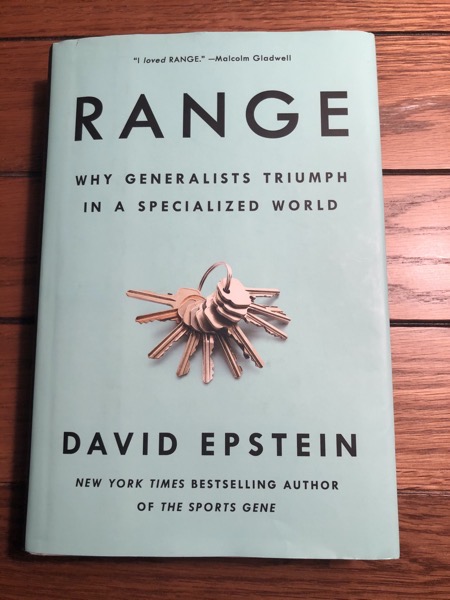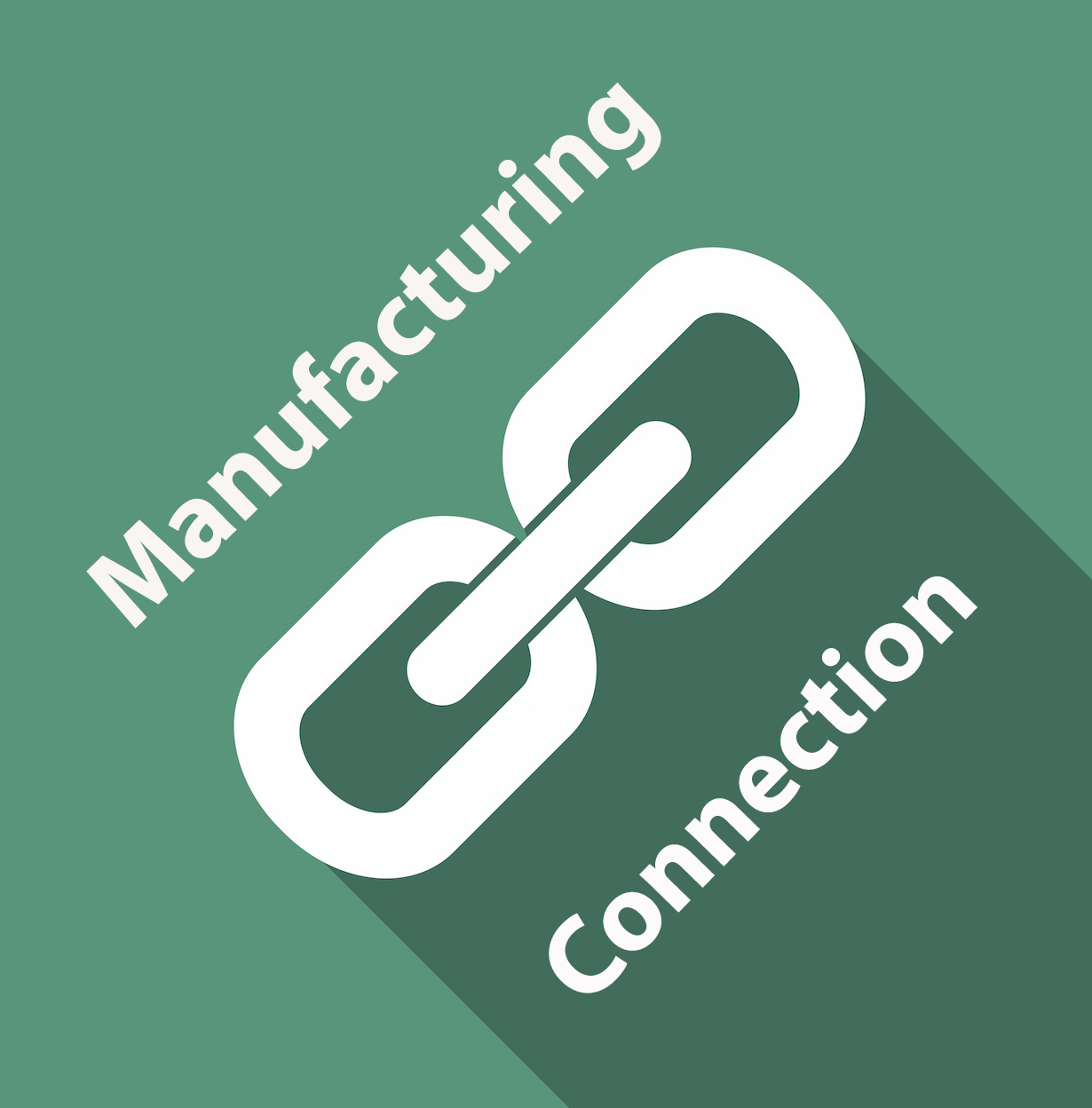
by Gary Mintchell | Oct 15, 2019 | Commentary, Education, Personal Development
This is a post about education, personal development, and why you should be a generalist.
Tiger Woods was trained almost from the cradle for one thing–to be the greatest golfer.
Roger Federer tried many sports. He loved soccer. Even though his mother was a tennis teacher, he didn’t pick up tennis until his early teens. Other kids had been playing for years by then. He soon passed them by and into his thirties is a dominant tennis star.
You need to be good at something, but it is good to be interested and experienced in many things.

I have a book to recommend. Range: Why Generalists Triumph in a Specialized World, by David Epstein. This book will help you learn to live a fuller life–and help you bring up your kids and encourage your grandkids.
Life in the industrial age, as well as in some previous eras, was composed of patterns. You could be trained to recognize patterns and adapt and become skilled at them. These are called “kind” learning environments. Kids excel who see and repeat the patterns.
Life today is what a psychologist call a “wicked” learning environment. Here, the rules of the game are often unclear or incomplete, there may or may not be repetitive patterns, and they may not be obvious, and feedback is often delayed, inaccurate or both. In most devilishly wicked learning environments, experience will reinforce the exact wrong lessons.
So, let’s look at responding to today’s “wicked” learning environment. “The bigger the picture, the more unique the potential human contribution. Our greatest strength is the exact opposite of narrow specialization. It is the ability to integrate broadly.” This all sounds great. But what about what I read in the news as the “typical Trump voter” who is a worker trained in the old way watching his job being replaced. And who is the leader who is poised to take them to this next level? Well, no one. Just leaders who play to their fears.
There are some courageous leaders changing the system for educating young people so that they can thrive in this new environment. We just have to have more of that. More people guiding young people—and older people, as well—need to take into practice this advice from psychologist and creativity researcher Dean Keith Simoton, “Rather than obsessively focusing on a narrow topic, creative achievers tend to have broad interests.” Modern work demands knowledge transfer—the ability to apply knowledge to new situations and different demands. In my life I have worked with both highly educated engineers AND high-school-educated technicians who exhibit this. More must be encouraged.
For those who, like me, studied broadly as an undergraduate and didn’t care much about grades, take this observation from professor and researcher James Flynn who was “bemused to find that the correlation between the test of broad conceptual thinking and GPA was about zero. Flynn, “The traits that earn good grades at [the university] do not include critical ability of any broad significance.
Here is a tip for those who teach at any level. When asking a student a question, force them to answer, even if it is wrong. Then just force them to answer again. And again. Until they get it right. Giving them hints to guide a correct answer quickly provided fewer long-term results than the first method. “Repetition is less important than struggle.”
Oh, and in a test of forecasting, experts were far worse than “amateurs” getting it right!
How does one adapt? By reading widely. Pursue several interests. That will be the human triumph in an age of robots.

by Gary Mintchell | Oct 3, 2019 | Education, Workforce
Emerson Global User Exchange brings thousands of geeks together to, well, exchange ideas. Most relate to technology and its applications. Some relate to personal growth and development. So far, I’ve captured the growing importance of Digital Transformation—both Emerson helping customers achieve their own, as well as, Emerson’s own transformation. We talked personal development with Dave Imming’s presentation on giving presentations. Then we discussed the Edge, Industrial Internet of Things, and connections. Today, I’m reporting on a presentation by Jim Cahill (for years he was called “Chief Blogger”) and Adam Thompson.
Personal Brand Building with Digital Transformation
The “Digital Transformation” part of the presentation was partly a reference back to the conference theme. But, the presenters also did a bit of compare and contrast of the older analog way of building personal connections and the newer digital way.
Cahill and Thompson told us that first we need to become an expert on some topic. How do we accomplish that? Well, the traditional way included reading books, attending classes, researching, attending conferences, reading trade magazines. Those between analog and digital might watch TV, also read books, scan social media,read blogs [maybe like mine…], attend conferences, read trade magazines, watch TED Talks. The digital people are on Netflix, YouTube, and social media, they watch TED Talks, are active on Emerson 365.
Next you must build your network. We traditionally do things such as trade business cards, attend conferences/events, reach out to authors, reach out to internal contacts, join groups. Moving on, you might make use of online groups such as Emerson 365 and LinkedIn groups both reading and contributing. Use hashtags both in your posts and searches.
Finally, you’ll want to share your expertise. Take the initiative. Present in company meetings. Find relevant conferences and construct presentations (see Dave Imming’s ideas). Share ideas and knowledge with press and influencers [we like input]. A great activity is to participate on industry standards committees or, if you are a programmer, contribute to an open source project. Write white papers.
Building a personal brand will help you and your company and often the community, as well.

by Gary Mintchell | Sep 30, 2019 | Education, Workforce
Presentations abound at Emerson Global Users Exchange. Attendees can choose to take deep technical dives into Emerson products, get overviews and trends of technology and the industry, and even personal development. Yes, there was even a 6 am fitness time with either running or Yoga.
Where’s “The Edge”? Yes, you can use good presentation skills for career success. Building Your Personal Brand through Digital Transformation–or social media an networking. Here’s a recap of the 2019 Emerson Global Users Exchange based upon several sessions I attended led by people I’ve known for a long time–Dave Imming, Mike Boudreaux, and Jim Cahill.
Presentation Skills for Career Success
Dave Imming, VP for QC at Emerson presented (well) about making good presentations as essential for career success.
First off–It’s important. Even in your first years as an engineer, you may be presenting ideas to management or even presenting at conferences. These help you become recognized and show your knowledge and ambition.
There are three steps to developing and presenting.
First, you must create a story. I’d emphasize even in a technical presentation making it flow. As you create your story, first you must determine the objective of the presentation. What are you trying to convey? Note: do this with pen and paper. Don’t create slides, yet. Next determine your audience. You must have a clear idea of whom your are talking to. The presentation will be different for your engineering team and for management. Hint: don’t create slides, yet. Now, determine your Key Points. [When I prepare, I use PostIt Notes so I can arrange them easily. Hint: stay away from the computer and don’t create slides, yet. Now you can construct your Story Line. How are you going to develop your ideas. [This is where I arrange and rearrange the PostIt Notes.] Oh, yes, don’t create slides, yet. You can research the Rule of 3 or 7 basic plot lines to help. Now Outline and still don’t create slides. FINALLY create your slides. Do not use text heavy or dense charts. Text should be 30 point. Find interesting and illustrative pictures with maybe a few words superimposed.
Refine and Rehearse—Do this verbally, aloud, several times. First with yourself several times, then to a friend
Stand and deliver—Most important is to have confidence, even while experiencing normal nervousness. Preparation breeds confidence. If you know the key points per slide-especially the first few to get into the groove-then your confidence will grow. Move with intention, do not pace like a caged animal. Make eye contact with one audience member at a time and hold for at least 5 seconds. That establishes connection with the audience.

by Gary Mintchell | Jun 9, 2017 | Productivity
I’ve been going through a number of notes accumulating over the past few months. Most relate to personal development and growth. This one I picked up from Kevin Roberts–long time leader in the advertising industry.
These are all important skills. If you’re unsure where you are and where to begin–try active listening. That is a basic skill in marriage, business, volunteer work, and any interpersonal interaction.
Developing a new skill? Try to find a way to use it daily. After 28-30 days it will become part of you. But you have to begin intentionally.
Here is Roberts’ list:
- Storytelling. One of the most effective ways of connecting with people. There is an art to it: plot, character, timing. Embroider and polish your best encounters.
- Mindfulness. Clear your head and focus on one thing at a time.
- Emotional thinking. Make the big decisions with your heart, the small ones with your head. The electromagnetic frequency of the heart is ten thousand times stronger than that of the brain. The brain takes its orders from the heart.
- Negotiating. I’ve learnt a lot about this from my children. There are times to be tough, and times to be tender. Figuring out which to do when is often the challenge!
- Delegating. Something my children have learnt from me. They all knew RASCI from a young age.
- Showing appreciation. Finding the right words can take a few goes but it’s always beneficial to show gratitude.
- Active listening. Your eyes have as much to do with this as your ears. The subtext, what’s not being said, always reveals a greater truth.
- Learning from your failures. A genius is someone who makes the same mistake once. We’re defined by the way we learn from our failures.
- Making lists. Hands-up everyone who puts things on a list just for the pleasure of crossing it off?! Be a compulsive to-doer. It keeps you going continuously forward.
- Have fun. It’s harder than it sounds! Slipping into business-as-usual mode is easy. Leisure needs to be planned, scheduled, sought out – and best done with other people.

by Gary Mintchell | Jun 24, 2016 | Podcast, Productivity
Here is my 150th podcast. I’m back on the theme of personal development–how people affect you. The source is Dr. Henry Cloud’s latest book The Power of the Other.
Research reveals that the types of connections we have with others affects our performance. Cloud intersperses research with examples from his practice to drive the point home.
Cloud discusses what makes for a “Corner Four” connection. This type of connection with people fleshes out just what we’d like to be and to experience in our relationships.
- Connection that fuels.
- Connection that gives freedom.
- Connection that requires responsibility.
- Connection that defangs failure and learning.
- Connection that challenges and pushes.
- Connection that builds structure.
- Connection that unites instead of divides.
- Connection that is trustworthy.
This is like a check list. But we can’t just follow a list. We make the list part of us reflected in the quality of relationships. Then by referring back from time to time during quiet time, we can remind ourselves where we’ve fallen short and need to improve.








